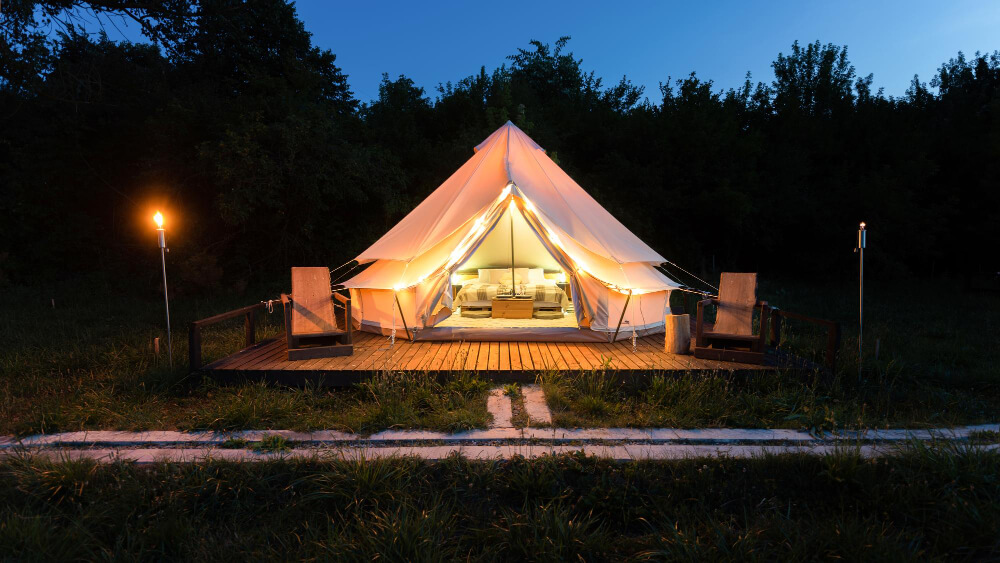Outdoor enthusiasts often seek unique experiences to connect with nature. Tentrr emerged as a platform to make camping more accessible and enjoyable.Given the ever-evolving business environment, it’s only natural to wonder: is Tentrr still in business?Let’s explore the history of Tentrr, its current status, and what it offers to campers.
History of Tentrr
Tentrr was founded in 2015 by Michael D’Agostino, who wanted to revolutionize camping. The idea stemmed from his love for the outdoors and the realization that traditional camping could be cumbersome. Setting up tents, booking campgrounds, and handling equipment often discouraged people from enjoying nature. Tentrr sought to eliminate these hassles.
The platform operates like Airbnb but for outdoor adventures. Landowners partner with Tentrr to offer private camping spots. Each site is pre-equipped with essentials like a canvas tent, a queen-size bed, and outdoor furniture. This elevated camping experience, often referred to as “glamping,” gained immense popularity.
Is Tentrr Still in Business?
Yes, Tentrr is still in business and thriving as of now. The company continues to provide unique camping experiences across the United States. Its platform remains active, with new sites being added regularly. Despite challenges faced by many travel businesses, Tentrr has managed to adapt and grow.
During the pandemic, outdoor activities like camping became more popular. People were eager to find safe ways to travel and enjoy nature. Tentrr benefited from this trend, as its private campsites allowed for social distancing. Many travelers turned to Tentrr for a safe and comfortable escape into the outdoors.
The company has also entered into partnerships to enhance its services. Partnerships with state parks and private landowners significantly broadened Tentrr’s footprint.From well-known natural landmarks to hidden gems, Tentrr offers diverse locations to suit every camper’s taste.
What Was Tentrr?
Tentrr isn’t just a campsite booking platform—it’s a reimagined way to experience the outdoors. At its core, Tentrr aimed to simplify camping while retaining the essence of adventure. It offered nature enthusiasts comfort and convenience while preserving the authenticity of the outdoor experience.
Tentrr Signature Sites are its hallmark offering. These sites are private and come fully equipped. Campers are welcomed with a roomy canvas tent, a cozy bed, and thoughtfully arranged seating areas.Essentials like a fire pit and camp toilet are also included. This eliminates the need to carry bulky equipment, making camping accessible for everyone.
For the more adventurous, Tentrr introduced Backcountry Sites. These are raw, untouched spots where campers bring their own gear. This option caters to those who prefer traditional camping but still want the convenience of a pre-arranged location. Tentrr offered something for every type of camper.
Early Signs of Trouble
Tentrr, a popular platform for unique camping experiences, saw early signs of trouble. Initially, Tentrr gained popularity due to its easy-to-use service for booking campsites. However, things started to change. Reports of customer dissatisfaction began to surface. Many users complained about the quality of campsites. Additionally, issues with customer service began to emerge. These early signs hinted at deeper problems within the company.
The platform faced technical difficulties as well. Frequent app crashes made bookings difficult. Users experienced frustration and inconvenience. Furthermore, Tentrr struggled with maintaining its network of CampKeepers. CampKeepers are essential for the Tentrr experience. They provide and maintain the campsites. However, many CampKeepers reported delays in payments. This led to a decline in campsite availability and quality.
Reason for Closure of Tentrr
The closure of Tentrr was sudden and surprising. Several factors contributed to this unfortunate outcome. One major reason was financial instability. Tentrr struggled to generate consistent revenue. The costs of maintaining the platform and paying CampKeepers were high. Additionally, marketing expenses drained resources. As a result, Tentrr faced financial difficulties.
Another reason for Tentrr’s closure was competition. The camping industry saw new players entering the market. These competitors offered similar services at competitive prices. Tentrr found it hard to keep up. The increased competition led to a decline in bookings. This further strained the company’s finances.
How CampKeepers and Customers Were Affected
Tentrr’s closure impacted both CampKeepers and customers, leaving hosts without payouts and travelers without reservations.CampKeepers faced significant challenges. Many relied on Tentrr for income. The sudden closure left them without a stable source of revenue. Payment delays worsened the situation. CampKeepers struggled to maintain their campsites. Some had to shut down their operations entirely. The impact on CampKeepers was severe and immediate.
Customers also experienced difficulties. Many had bookings canceled abruptly. This led to frustration and inconvenience. Refunds were delayed, causing financial distress. Customers who enjoyed Tentrr’s unique camping experiences were disappointed. The closure left a gap in the market for personalized camping services. Loyal users felt abandoned and let down.
Is Tentrr Coming Back to the Market Soon?
With Tentrr’s closure, many wonder if it will return. Currently, there is no official statement about a comeback. However, there are signs that Tentrr may revive. The company may be exploring restructuring options. Financial recovery plans could be in the works. Tentrr’s unique concept still has potential. If managed well, it could attract investors and users again.
Tentrr’s revival depends on several factors. Addressing past issues is crucial. Improving customer service and campsite quality is necessary. Restoring trust with CampKeepers will be important. Financial stability must be ensured. Tentrr needs a sustainable business model. Effective marketing strategies will help regain the customer base.
Conclusion
Tentrr faced significant challenges leading to its closure. Early signs of trouble included customer dissatisfaction and operational issues. Financial instability and competition were major factors. The closure affected both CampKeepers and customers. While Tentrr’s future is uncertain, there is potential for a comeback. Addressing past issues and improving operations could revive the company. The camping industry still has space for innovative services like Tentrr.
Also Read:

